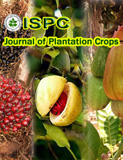Customized fertilizers for higher yield and income: Evidences from on-farm validation in coconut – tuber crop intercropping system
DOI:
https://doi.org/10.25081/jpc.2023.v51.i1.8468Abstract
Fifteen on-farm experiments were conducted in tropical tuber crops intercropped in coconut gardens in Thiruvananthapuram, Kollam and Pathanamthitta districts, Kerala, during 2018-2021 for the validation of customized fertilizers formulated from on-station developed Site-Specific Nutrient Management (SSNM) practices. The validation experiments were done under the aegis of ICAR-Central Tuber Crops Research Institute, Thiruvananthapuram, in a project funded by Coconut Development Board, Kochi, Kerala.Three treatments viz., T1: SSNM technology using customized fertilizers (CF) (SSNM), T2: present POP recommendation (POP) and T3: farmer's practice (FP) was evaluated in cassava, elephant foot yam and greater yam intercropped with coconut. System productivity and profitability were worked out for the different treatments based on yield and income from coconut and tuber crops in the respective treatments. Pooled analysis indicated that the coconut yield under intercropping with tuber crops under SSNM using CF was higher by 12-23% in comparison to coconut monocrop maintained unscientifically by the farmers. Tuber yield under CF proved superior over POP by 9.3% and FP by 37.4%. On an average, the net income from coconut-tuber crop intercropping system under SSNM using CF was ₹ 270396 per ha, whereas it was ₹ 198047 in POP and ₹146358 in FP and significantly outperformed sole coconut (₹ 7764).Thus, the results of the validation experiments indicated that the use of customized fertilizers in tuberous intercrops offered resilience with higher system productivity and profitability from coconut gardens.
Downloads
References
Byju, G. and Suja, G. 2020. Mineral nutrition of cassava. Advances in Agronomy 159: 169-235.
Byju, G., Nedunchezhiyan, M., James George, Sunitha, S., Sabitha Soman and Hridya, A.C. 2020. Fertilizer best management practices by SSNM and customized fertilizers for cassava (Manihot esculenta Crantz) cultivation in India. Current Horticulture 8(1): 56-64.
Byju, G., Nedunchezhiyan, M., Hridya, A.C. and Sabitha Soman. 2016a. Site-specific nutrient management for cassava in southern India. Agronomy Journal 108: 830-840.
Byju, G., Jaganathan, D. and Sanket J. More. 2018. Twelfth Plan Achievements: Success Stories. Technical Bulletin Series 67. ICAR-Central Tuber Crops Research Institute, Sreekariyam, Thiruvananthapuram, 48 p.
Byju, G., Nedunchezhiyan, M., George, J., Sunitha, S., Kamalkumaran, R., Singh, P.P., Mamatha, K., Mitra, S., Tarafdar, J., Desai, K., Ravi, V., Vani, M., Sabitha Soman and Remya Ramesh, K.R. 2016b. Fertilizer best management practices by SSNM and customized fertilizers for elephant foot yam (Amorphophallus paeoniifolius) cultivation in India. Indian Journal of Agricultural Sciences, 86(4): 485-493.
Byju, G., Nedunchezhiyan, M., Ravindran, C.S., Santhosh Mithra, V.S., Ravi, V. and Naskar, S.K. 2012. Modeling the response of cassava to fertilizers: a site-specific nutrient management approach for higher tuberous root yield. Communications in Soil Science and Plant Analysis 43: 1-14
CDB. 2020. Coconut development board, Ministry of Agriculture and Farmers Welfare, Kochi, Kerala (coconut board.gov.in/Statistics.aspx)
Jinimol Raju and Byju, G. 2019. Quantitative determination of NPK uptake requirements of taro (Colocasia esculenta (L.) Schott). Journal of Plant Nutrition, 42: 203-217. https://doi.org/10.1080/01904167.2018.1554070.
Menon, S.K. and Nayar, T.V.R. 1978. Effect of intercropping with tuber crops in root (wilt) affected coconut garden. 416-424. In: Proceedings of Ist Plantation Crops Symposium (PLACROSYM I). PLACROSYM standing committee, Central Plantation Crops Research Institute, Kasaragod.
Nayar, T.V.R. and Suja, G. 2004. Production potential of root and tubers in multiple cropping systems involving plantation crops. Journal of Root Crops 30(2): 93-100.
Prince Kumar, Byju, G. Singh, B.P. Minhas, J.S. and Dua, V.K. 2016. Application of QUEFTS model for site-specific nutrient management of NPK in sweet potato (Ipomoea batatas L. Lam). Communications in Soil Science and Plant Analysis 47(13-14):1599-1611.
Remya Remesh, K.R. and Byju, G. 2018. Estimation of nutrient uptake requirement of yams in India based on QUEFTS model. Journal of Root Crops 44 (2): 12-22.
Remya Remesh, K.R. and Byju, G. 2020. Validation of QUEFTS model for site specific nutrient management of yams. Agricultural Research Journal 57(1): 37-46.
Sabitha Soman and Byju, G. 2017. On-farm validation of site specific nutrient management in cassava (Manihot esculenta) in Thiruvananthapuram district, Kerala. Current Horticulture 5(10): 20-29.
Suja, G. 2005. Impact of nutrient management on biomass production and growth indices of white yam (Dioscorea rotundata Poir.) intercropped in a coconut plantation in South India. Tropical Agriculture 82(3): 173-182.
Suja, G., Nair, V.M., Saraswathy, P. and Nayar, T.V.R. 2004. Response of white yam intercropped in coconut garden to organic manures, nitrogen and potassium. Journal of Plantation Crops 32(2): 21-27.
Published
How to Cite
Issue
Section
Copyright (c) 2023 Journal of Plantation Crops

This work is licensed under a Creative Commons Attribution 4.0 International License.







 .
.